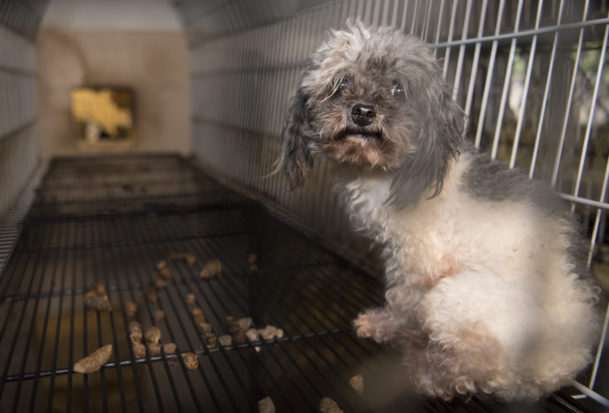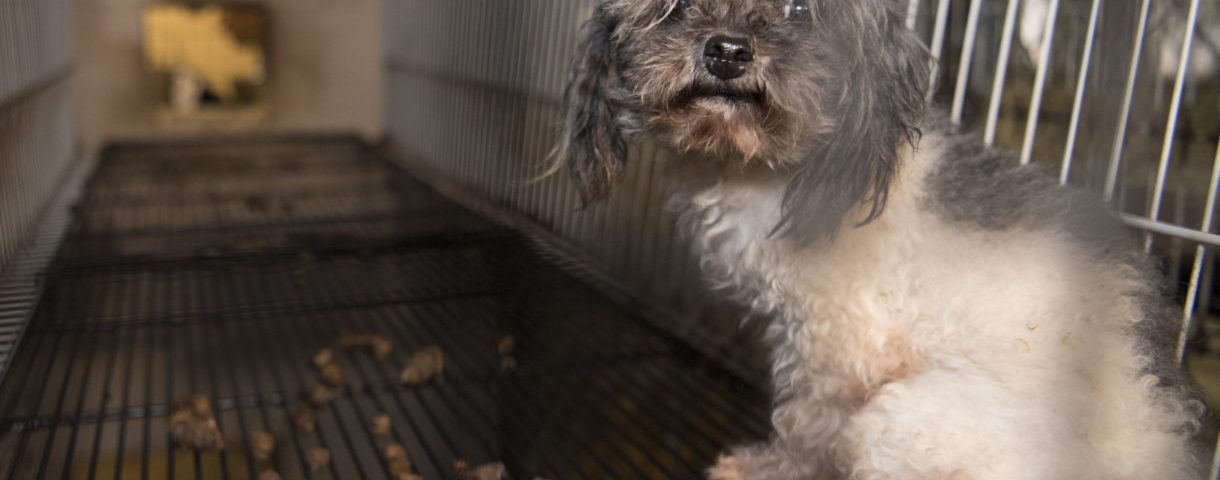There’s an outpouring of anger and mistrust about the U.S. Department of Agriculture’s abrupt decision to delete from its website inspection reports on thousands of commercial dog breeding operators, Tennessee walking horse show participants, roadside zoos, animal research labs, and other facilities regulated under the federal Animal Welfare Act (AWA) and Horse Protection Act (HPA). On February 7th, The HSUS took the first step to initiate legal action to challenge this outrageous action that undermines longstanding consensus about public access to information concerning these laws, and frustrates state, local, and industry efforts to help enforce them.
The HSUS sued the USDA in 2005 over public access to AWA reports concerning animal use in university and other laboratories. That case was settled in 2009 in exchange for the USDA’s agreement to post certain data on its website concerning research on animals. The agency’s precipitous decision to purge virtually all AWA and HPA enforcement documentation – just two weeks after President Trump assumed office — violates the plain terms of the settlement and a federal court order. It also runs contrary to Congressional provisions in 1996 and 2016 designed to increase transparency and electronic access to information.
Under the order, once we file a notice of a violation, the parties must consult for 30 days to try to resolve the dispute. If that is not successful, the agency can be ordered to comply or be held in contempt. The prior lawsuit only covers some of the vast corpus of important enforcement data the USDA has scrubbed from its website. We hope this mandatory consultation period will give the USDA a chance to reconsider this ill-advised and precipitous maneuver across the board.

Seven states bar the sale of puppies from mills with a history of gross violations of the Animal Welfare Act. The USDA’s action leaves regulated dog sellers in those states with no practical way to comply with laws, and state and local law enforcement with almost no ability to enforce them. Photo by Meredith Lee/The HSUS
There is more than just a principle of transparency and good government at stake here. These documents are essential to a wide range of matters of direct interest to The HSUS, dozens of other animal welfare groups, state and federal lawmakers and regulators, regulated businesses, and many other stakeholders who rely upon the records of a public agency. Like every federal agency, the USDA operates thanks to the generosity of taxpayers, and it must be accountable to them. The USDA is changing the equation for the worse for animals and the public with this action. Let me break that down in very practical terms.
Puppy mills:
In a piece published last month in Rolling Stone titled “The Dog Factory: Inside the Sickening World of Puppy Mills,” writer Paul Solotaroff described horrific violations at puppy mills, many of which are licensed and inspected by the USDA, but still violate the Animal Welfare Act repeatedly. One Iowa breeder threw a bag containing dead puppies at his USDA inspector. Another Iowa breeder threatened to stab his inspector with a syringe, after the inspector cited him for shooting and killing one of his dogs. These violations only came to light due to the USDA’s online database of puppy mill inspection reports.
Last year, the USDA revoked the licenses of nine horrific puppy mills, most of which The HSUS had identified repeatedly in our annual Horrible Hundred reports. They include Jinson Kennels in Missouri (owned by Wilma Jinson), which was repeatedly found with dead dogs or puppies on its property; Rabbit Ridge Kennel in Missouri (owned by Donald Schrage), which failed to get proper care for more than 90 dogs and puppies over a period of many years; and the facility of Dwayne Hurliman in Oklahoma, one of the largest puppy mills in the country, which once had more than 1,000 dogs. Without the availability of public inspection records, The HSUS would have had great difficulty obtaining the information we needed to press the agency on these cases.
Thanks to The HSUS’s efforts, and the work of thousands of grassroots advocates, seven states bar the sale of puppies from mills with a history of gross violations of the Act. The USDA’s decision to wipe its website clean of inspection reports leaves regulated dog sellers in those states with no practical way to comply with those laws, and state and local law enforcement with almost no ability to enforce them. Without ready access to information, it will be nearly impossible for consumers, law enforcement agencies, policymakers, and pet stores to know which breeders had violations.
Animal research:
Tens of millions of animals are used in research, testing, and education every year in the United States. The public will no longer have ready access to information about hundreds of animal research institutions, including universities, pharmaceutical companies, and federal laboratories using animals regulated under the AWA. This includes information on the number and type of animals (such as dogs, cats, primates, and other species) used as well as how many are subjected to unrelieved pain and distress and the corresponding justification -– information that each facility is required to report annually. Instead, The USDA says the information must be obtained via submission of written FOIA requests which usually take many months or even years to process, and often at a substantial cost to the requester.
Horse soring:
This is a second punch in the gut by the Trump administration to horse protection advocates fighting the criminal behavior of the pain-based Big Lick segment of the walking horse industry. The new administration earlier froze a near-finalized USDA rule to crack down on the abusers (there’s a major movement in Congress to turn that around). The denial of real-time access to information about offenses committed under the HPA will frustrate efforts to show the extraordinary violation rates for horse show participants – a data set that has made it clear that this segment of the industry is openly, routinely defying federal law. What’s more, the wiping away of these records from the Internet will hurt the effort by legitimate horse owners to shun the abusers. Many walking horse enthusiasts and newcomers who do not sore their horses or approve of soring use this information as a resource to see who they should select or not select as a trainer, as a breeder, or as a co-owner of a horse, or while purchasing a horse. During The HSUS’s investigation into soring at Thorsport stables in Murfreesboro, Tenn., we discovered that Vida Blue -– one of the horses trained and sored at Thorsport – was owned by Gayle Holcomb, who had a minimum of 10 HPA violations from 2010 to 2015. We found Holcomb’s soring history on the publicly-available USDA database that the new administration has now made disappear.
Exotic animals and roadside zoos:
The HSUS has tracked violations from inspections of roadside zoos, and has put that information in a form that gives state and federal lawmakers and regulators a broad picture of how this industry is complying with the AWA. Officials in a Tennessee county, for example, halted plans for a new drive-thru safari park after discovering the exhibitor had many AWA violations at another location. Our petition to the USDA to prohibit public contact with bears, big cats, and primates relied on historical abuses documented by federal inspectors of exhibitors engaged in these harmful practices. This morning, the Association of Zoos and Aquariums, which has a rigorous accreditation program and which shares our concerns about roadside zoos, called on the USDA to restore the inspection reports on its website. “When the Department of Agriculture decided to take all animal welfare inspection reports offline, there is no doubt some APHIS licensees were very happy: Those who have no desire for the public to know about their animal welfare record,” said the Honorable Dan Ashe, President and CEO of the AZA
Brian Klippenstein, the director of Protect the Harvest – an explicitly anti-animal welfare group formed specifically to fight The HSUS – is leading the transition team at the USDA. Shielding animal abuse records from public view is a long-held ambition of that organization which defends puppy mills, roadside zoos, horse sorers, animal fighters, and others with something to hide when it comes to animal cruelty and suffering. Forrest Lucas, the founder and financier of Protect the Harvest, donated hundreds of thousands of dollars to fight Prop B in Missouri – an anti-puppy-mill ballot measure – and worked to finance a repeal effort when Missouri voters approved it. Last year, Klippenstein was up in Massachusetts, campaigning against Question 3 in Massachuetts – to no avail, with voters approving the measure by an overwhelming 78 percent. Lucas donated a quarter million dollars to fight Question 3.
This withholding of information that the American public has a right to see appears to be an inside job at the USDA – with the head of the Trump transition team probably directing the show. You’d think that USDA would want the work of its field personnel to be examined and used by the public. But this action suggests a deliberate effort to bury its work and impede efforts to ensure the well-being of animals in numerous sectors. The HSUS will continue to pursue this matter until public access is fully restored. Please sign our petition urging the USDA to stop hiding animal welfare records and covering for abusers.
The post The HSUS challenges USDA over mass removal of animal welfare records appeared first on A Humane Nation.
Enviroshop is maintained by dedicated NetSys Interactive Inc. owners & employees who generously contribute their time to maintenance & editing, web design, custom programming, & website hosting for Enviroshop.
